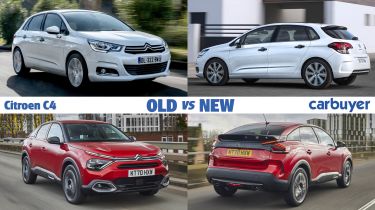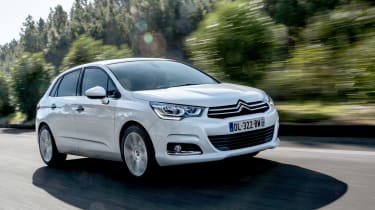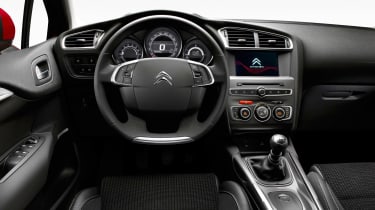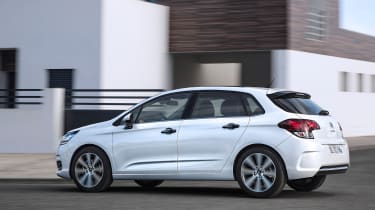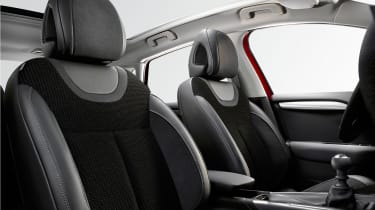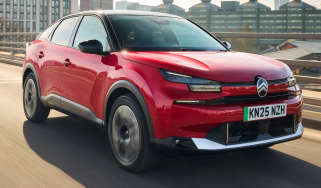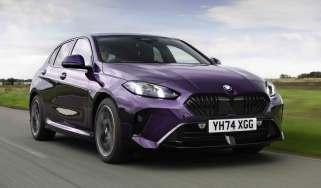Citroen C4: old vs new
The last Citroen C4 was always an underdog as a hatchback, but has an SUV makeover made it more desirable?
The second generation Citroen C4 never quite struck the right notes with UK car buyers. It launched in 2011 into a competitive family hatchback sector that was coming under increasing pressure as a result of the rise in popularity of SUVs. If you can’t beat them, join them, the saying goes and Citroen clearly took that to heart, launching a new C4 with pronounced SUV overtones in 2020. Let’s find out what’s changed and if today’s C4 can deliver the goods.
 The 10 best hatchbacks to buy in 2025
The 10 best hatchbacks to buy in 2025
The old C4 hatchback was a worthy if forgettable challenger to the likes of the Ford Focus, Volkswagen Golf and Vauxhall Astra, as well the Renault Megane and Peugeot 308. It launched in 2011 replacing the original Citroen C4 that dated back to 2004. While it didn’t look as striking and wasn’t as exciting to drive as its rivals, it did offer value for money, comfort and practicality that were competitive in the family hatchback class.
Fast forward to 2020 and the French carmaker gave the C4 a complete makeover. Featuring modern SUV-like styling with a chunky shape and sharp details, the current C4 certainly stands out more than it did in its previous guise. But has it sacrificed its comfort and practical qualities as a result? Thankfully not. The C4 remains very comfortable, has plenty of room for adults in the rear seats, and comes packed with equipment. There’s the option of an electric powertrain now, too.
Design
The original Citroen C4 wasn’t blessed with the most striking looks. The low key design meant it appealed more to those with utility and comfort at the top of their shopping lists. Citroen recognised this and its designers knew that the reinvented C4 would need to be more appealing to the eye in order to steal the hearts of Ford, Volkswagan and Renault customers.
Citroen has strongly played up to the popularity of SUV styling with the latest generation C4, making the car more fashionable and more desirable in the process. It combines a dramatic sloping roofline with some intricate detailing, alongside sharp LED headlights and 18-inch alloy wheels. Its stylish new looks alone should be enough to get it noticed alongside rival family hatchbacks, while also putting it up against design-led SUVs like the Toyota CH-R.
Interior and specs
While the likes of Ford and Volkswagen focused on making their family hatchbacks fun to drive, Citroen has always been a brand more interested in comfort. As a result, the second generation C4 hatchback was labelled as one of the most cosseting cars in its class. The C4 was always good at keeping road noise to a minimum, too, ensuring a quiet cabin on long-distance journeys at motorway speeds. Like its predecessor, the new SUV-flavoured C4 is intended to be the most relaxing car in its class and it lives up to that expectation.
While the C4 of 2011 didn’t dazzle on the outside, it did have a pretty stylish cabin. There were far too many buttons and switches on the steering wheel but the build quality felt sturdy, if not quite as premium as that in the VW Golf. The new C4 boasts an entirely new cabin, featuring a striking design and enough soft-touch, textured materials and piano black detailing to prevent it from feeling cheap. It’s a big step forward in almost every respect, but it needed to be.
Equipment levels have never been a problem for the Citroen C4. The Mk2 car came in three trim levels - Touch, Feel and Flair. The entry-level Touch gave buyers electric-adjustable heated door mirrors, air-conditioning, cruise control, hill-start assist and height-adjustable front seats, all as standard. Feel, meanwhile, added a DAB digital radio with Bluetooth phone connectivity, a leather steering wheel and gear knob, stop-start and 16-inch alloy wheels. The range-topping Flair came with fog lights, automatic lights and windscreen wipers, rear electric windows, rear parking sensors and a seven-inch touchscreen infotainment system.
The trim levels for the new C4 have been reimagined, however, totalling four options for buyers to choose from. Named Sense, Sense Plus, Shine and Shine Plus, all come with a very competitive range of kit, featuring LED headlights, 18-inch alloy wheels, dual-zone climate control, rear parking sensors and a 10-inch touchscreen. Sense Plus adds a head-up display, rear-view camera and folding door mirrors. It also adds a unique pull-out tray to accommodate a tablet.
Shine cars get front parking sensors, rear tinted privacy glass and adaptive LED headlights, while Shine Plus models are notably more luxurious than any of the other cars in the range - and possibly more luxurious than you’d expect from a Citroen. They boast leather heated seats, a wireless charging pad and premium sound system among other features.
Economy and performance
The second generation C4 was originally offered with three diesel engines, with power outputs ranging from 98 to 150bhp. The mid-spec 118bhp BlueHDi 120 model was our favourite at the time, since it offered the best balance between pace and fuel economy. The C4's steering wasn’t very sharp or accurate and its soft suspension meant there was far too much body lean through corners. But it did redeem itself by being an excellent motorway cruiser.
The new C4, comes with a choice of three powertain types. There are petrol and diesel units available with a range of power outputs and gearboxes. Then there’s also an all-electric option, something very few of its competitors can offer.
Badged e-C4, the all-electric model is powered by a single electric motor, which drives the front wheels, and it can accelerate from 0-62mph in a respectable nine seconds. The 1.2-litre PureTech petrol variants are expected to be the most popular, however, managing up to 50mpg with a manual gearbox.
In line with its traditional aim of being a class-leader in comfort, Citroen has fitted its Progressive Hydraulic Cushion suspension. It’s designed to soak up the worst bumps in the roads and it does that perfectly well, giving it a clear advantage over most other family hatchbacks. The light steering and body lean is still there, however, and it’s not as fun whipping around twisting back roads as the Ford Focus.
Practicality
The old C4 benefited from a sizable boot with a relatively roomy and practical cabin, but that model didn’t cater well for rear-seat passengers in terms of legroom - especially when compared to a Volkswagen Golf. That said, these second generation C4s were all designed with utility in mind, offering plenty of useful cubbyholes for storage and automatic models even got a refrigerated area in the centre console in place of the gear stick. The C4’s boot trumped its rivals, too, totalling at an impressive 408 liters, increasing to 1,300 litres with the rear seats folded.
With slightly larger exterior dimensions, the new C4’s crossover design with a sloping coupe-roofline hasn’t compromised the interior space and there’s plenty of room inside for four six-foot adults. Like in its predecessor, there are a number of storage compartments dotted around the car, adding around 40 litres of storage for personal items. Unfortunately, the new C4's boot measures-up a tad smaller than the old model, at 380 litres. It matches the VW Golf, though, even when folding the rear seats down to total at 1,250 liters of luggage space. These figures remain unchanged for the electric e-C4 version, too, which is impressive, considering boot space is usually lost in electric cars to accommodate large batteries.
Safety
While Citroen may not be renowned for its build quality and driving dynamics, it has quite a reputation for building safe cars. The old C4 was awarded five stars when it was tested by Euro NCAP in 2010 and it also scored well for adult occupant protection and the provision of safety systems. It came equipped with features such as electronic stability control, traction control, hill-start assistance and six airbags, while there are ISOFIX child-seat mountings on the rear seats.
The new model has lost a Euro NCAP star but with the crash tests becoming more stringent every year, it’s still a big step forward in terms of safety. There’s a total of 20 driving aids fitted , the same number found in the more expensive Citroen C5 Aircross SUV. Unlike the old car, the new C4 gets autonomous emergency braking and Highway Driver Assist, which combines adaptive cruise control with lane keeping technology.
The new C4 can also has technology that can evaluate how the car is being driven to check that the driver is alert. In the event it thinks the driver is losing concentration, such as a dramatic change in driving manner or a strange pattern in speed levels, the C4 will suggest they take a break. Other features include blind spot monitoring, the ability to flag up road signs in the instrument display, and automatic headlights which can switch between main and dipped beam.
Verdict
Aside from Citroen continuing to prioritise comfort and practicality over performance and handling just as it always has, the C4 has been completely reinvented in its latest guise. That’s not to say buyers should disregard the old hatchback entirely, though.
The new SUV-styled C4 now looks as good as it feels and is equipped with the latest in-car tech. It’s an appealing option for buyers looking for something more striking and versatile than a standard family hatchback but not wanting to step up to a full-blown SUV. It does come with at least a £20,990 price tag, though.
In comparison, you can pick up a used 2014 Citroen C4 for just under £5,000, or £105 a month on PCP finance. It may not look as exciting, but it’s still a worthy family hatchback with those comfortable, practical qualities that Citroen has always been able to reproduce.
Read our in-depth review of the new Citroen C4 hatchback and its rivals, including the Ford Focus, Volkswagen Golf and SEAT Leon.
Recommended
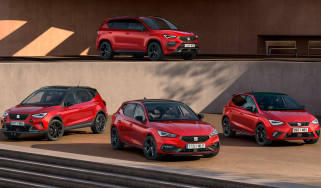
SEAT releases new Black Edition models with sportier styling
Most Popular

New Smart #5 Brabus is a 637bhp far cry from the brand’s city car past

Best car leasing deals 2025: this week’s top PCH offers
Tips & advice

Car dashboard warning lights: what does each symbol mean?

Electric car charging stations: public networks, charger types, apps and maps

